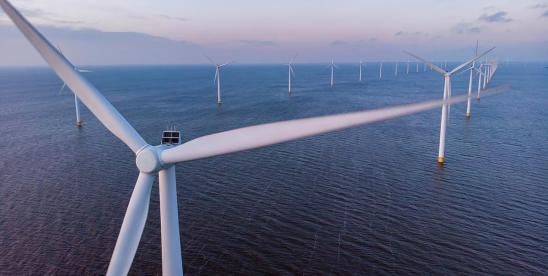The US Court of Appeals for the First Circuit has affirmed the dismissal of two legal challenges to the Vineyard Wind 1 project (the Project). On April 24 and April 25, 2024, the same panel of First Circuit judges issued opinions in Nantucket Residents Against Offshore Wind (ACKRATS) v. BOEM and in Melone v. Coit, affirming the Massachusetts district court’s decisions to grant summary judgment in favor of the federal government on the grounds that federal agencies properly considered the Project’s impacts on the endangered North Atlantic right whale. The decisions are the first federal appellate victories for Vineyard Wind 1, which is currently under construction offshore of Massachusetts. Once complete, Vineyard Wind 1 is expected to generate up to 800 megawatts of renewable energy.
Summary Judgment Granted
In the summer of 2023, US District Judge Indira Talwani of the District of Massachusetts denied claims in two cases seeking to vacate several of the Project’s key federal approvals. First, in ACKRATS v. BOEM, an association of Nantucket residents opposed to offshore wind development asserted that the Bureau of Ocean Energy Management (BOEM) and the National Marine Fisheries Service (NMFS) violated the Endangered Species Act (ESA) and the National Environmental policy Act (NEPA) by failing to conduct adequate environmental reviews of the Project and failing to properly consider its impacts on the North Atlantic right whale and other ESA-listed species. The district court denied these claims on the basis that NMFS and BOEM complied with both laws and adequately evaluated the Project’s impacts.[1]
The district court reached a similar conclusion in Allco v. Haaland, [2]where an onshore renewable energy developer attempting to disrupt offshore wind development argued that NMFS’s approvals of the Project were deficient under the Marine Mammal Protection Act (MMPA) for failing to consider and address the Project’s potential negative impacts on marine mammals, including the North Atlantic right whale. The district court was not persuaded by the plaintiffs’ arguments and found that NMFS complied with the MMPA when issuing an approval to the Project.
The Appeals
Plaintiffs in both cases appealed to the First Circuit. After oral argument, US Circuit Judge William J. Kayatta Jr. wrote unanimous opinions affirming the district court’s decisions to dismiss both cases. In ACKRATS v. BOEM, [3] the First Circuit found that:
- NMFS’s biological opinion (BiOp) properly considered the best available scientific data on North Atlantic right whale impacts, as required by the ESA. The court was unpersuaded by the appellants’ arguments that the BiOp failed to grapple with various scientific studies.
- NMFS was entitled to deference for its decision to rely on certain scientific studies. Overall, the court viewed plaintiffs’ pleadings as arguing that NMFS should have weighed certain scientific studies more heavily than it did. The court declined to question NMFS’s judgment and instead chose to defer to NMFS’s evaluation of claims about competing bodies of scientific research.
- The BiOp adequately analyzed the Project’s potential effects on the North Atlantic right whale, including construction noise, operational noise, fishing line entanglement, and vessel strikes. The court found the appellants failed to show that NMFS acted arbitrarily or capriciously in concluding that the required mitigation measures — which consisted of soft start pile driving, seasonal pile driving restrictions, passive acoustic monitoring, protected species observers, and more — were adequate to address right whale impacts.
- Finally, the court found that because NMFS’s BiOp is not defective, BOEM did not violate NEPA by relying on the BiOp. The court concluded that BOEM’s Final Environmental Impact Statement considered the findings of NMFS’s BiOp and thoroughly analyzed the Project’s effects on North Atlantic right whales and the broader environment.
In Melone v. Coit,[4] the First Circuit similarly found that the appellant’s claims were without merit and referred to the decision in ACKRATS v. BOEM issued the previous day. First, the court rejected the appellant’s argument that Vineyard Wind should not have been permitted to intervene as an intervenor-defendant because Vineyard Wind has significant interests in the litigation sufficient to support permissive intervention given its $300 million+ investment in the Project at the time it moved to intervene. On the merits of the appellant’s MMPA claims, the court held that NMFS did not violate the MMPA or otherwise act arbitrarily or capriciously when issuing an Incidental Harassment Authorization (IHA) to Vineyard Wind. The court found that:
- NMFS did not err in finding that the Project’s potential non-lethal harassment of 20 North Atlantic right whales, or 5.4 percent of the population, constituted a “small number” under the MMPA. The court was persuaded by opinions in which other courts upheld NMFS’s “small number” determinations, including a decision upholding NMFS's determination that a take of 10 percent of the beluga whale population affected a "small number" of beluga whales.
- The court found that NMFS properly considered the Project’s proposed activities and the type of harassment that was expected to occur. The First Circuit agreed with the district court that NMFS was entitled to deference, as the agency applied its scientific expertise to make a finding that the proposed take would have a “negligible impact” on the North Atlantic right whale.
- The court disagreed with the appellant’s argument that the “specified activity” proposed and the “specific geographic region” where incidental harassment may occur were impermissibly narrow in scope. The court found that NMFS’s definitions of “specified activity” (pile driving associated with project construction during a one-year period, including the use of vessels to support pile installation) and “specific geographic region” (Vineyard Wind’s lease area) were properly defined consistent with the requirements of the MMPA.
Takeaways
These First Circuit decisions mark the first appellate decisions affirming the federal government’s issuance of permits to the Vineyard Wind Project. The precedent set in the First Circuit and the federal government’s successful defense of Vineyard Wind will shape the trajectory of the emerging offshore wind sector and litigation against other offshore wind projects.
[1] Nantucket Residents Against Turbines, et al. v. United States Bureau of Ocean Energy Mgmt., et al., 675 F.Supp. 3d 28 (D. Mass. 2023).
[2] Allco Renewable Energy Ltd., et al. v. Haaland, et al., No. 1:21-cv-11171-IT, Dkt. No. 178 (D. Mass. Aug. 4, 2023).
[3] Nantucket Residents Against Turbines, et al. v. United States Bureau of Ocean Energy Mgmt., et al., 2024 U.S. App. LEXIS 9897 (1st Cir. 2024) (“ACKRATS v. BOEM”).
[4] Melone, et al. v. Coit, et al., 2024 U.S. App. LEXIS 10079 (1st Cir. 2024) (previously Allco Renewable Energy Ltd., et al. v. Haaland, et al., the case caption changed on appeal to the First Circuit) (“Melone v. Coit”).





 i
i


